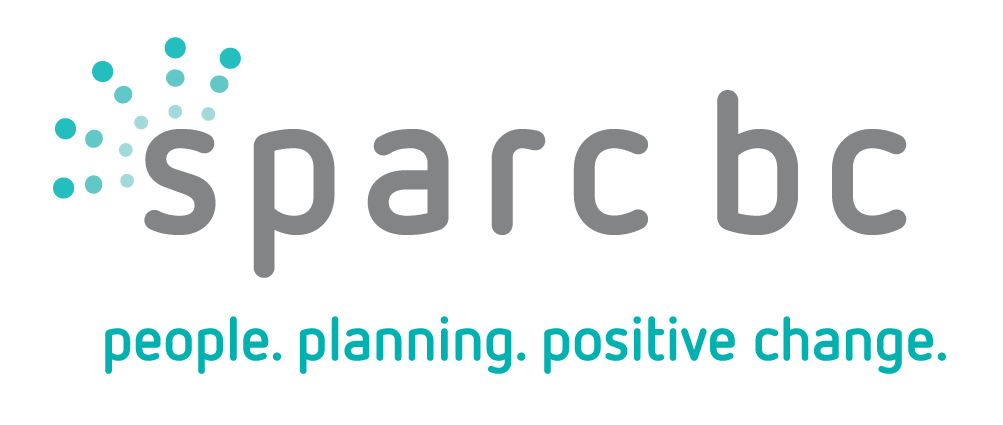History, Values and Culture
Home » About Us » Mission and Values » History, Values and Culture

- The concept of SPARC BC was conceived during a brown bag lunch in the spring of 1961, attended by Deryck Thomson, Family Services; Ernie Hill, Director of Social Planning for United Community Services; and, Gordon Selman, Associate Director of Adult Education at UBC.
- A B.C. Conference on Social Welfare was planned for 1962 and, at the conference, there was general agreement on the need for a permanent voluntary organization that would:
o Act as an information and consultation centre for planning and coordination of health and welfare services on a province-wide basis.
o Act as a liaison among the various groups.
o Help interpret government legislation for local community councils, in turn assisting them in representations to government.
o Communicate the problems of health and welfare to a wider public audience.
- The name chosen for the organization was “The Voluntary Association for Health and Welfare of B.C.” (VAHW) and, on October 4, 1966 VAHW was incorporated.
- 1968 - Audrey Selander became the first Executive Director.
- The organizational name was changed to SPARC of BC, the Social Planning and Review Council of BC, with Review later changed to Research when SPARC BC took over the research functions of the United Way of the Lower Mainland.
- In the early years, the work of SPARC BC was generated primarily by standing committees. At the beginning of 1969, these consisted of the Panel for Guidance of the Handicapped, the Committee on Ageing, the Health Committee, the Housing Committee, and the United Appeals Division (later known as the United Way of BC). The strong thrust of these committees was the involvement of citizens in planning and policy development in their particular fields.

- One of the first projects was the 1973 “Community Care for Seniors Study” which eventually became one of the reference documents used to design the BC Long Term Care Program.
- In 1976, SPARC BC’s Committee on Architectural Barriers succeeded in establishing legislation regarding building code requirements, so buildings could be fully accessible for people with disabilities.
- In 1977, the Panel for Guidance of the Handicapped published an information kit called “Special Parking in BC” and started to issue decals to enable people with disabilities to park in designated parking spaces. This booklet was later revised and is now called “Making Spaces for Everyone”.
- As a provincial organization, SPARC BC has always, through consultation and encouragement, sought to foster development of effective local community organizations for coordinating and planning of health and social services. This is exemplified by the early project analyzing the model of coordination of local services by the Abbotsford Community Services Agency. The findings were published in “What Happened in Abbotsford” by Richard Naan and Walter Paetkau (later president of SPARC BC from 1979-1981) in 1974.

- In 1984, key program decisions were made:
o Expansion of the membership base for province-wide credibility and increased financial support.
o Review and redevelopment of the Disabled Persons Parking Placard Program.
o Discontinuance of the standing committees.
o Creation of new policy priorities to focus efforts on local economic development.
o Negotiation with the United Way of the Lower Mainland for much greater financial support for a three year period. An agreement was reached that the United Way would close its own planning committee and SPARC BC would become the primary social research, policy and advocacy body in the Lower Mainland and the province.
- From 1985, the membership and donor program began to develop, and the first SPARC NEWS was published.
- With increased funding from the United Way, SPARC BC was able to enter into the policy research area in a way not done before. The ability to undertake self-directed research, without approval from an outside funding group, enabled a certain freedom. Michael Goldberg was hired as the first Director of Research in 1987.

- In 1991, the Deryck Thomson Award for Community Social Planning was established to honour Deryck, a founding member of SPARC BC, and to acknowledge contributions to the social well-being of our communities in general and to families and children in particular. The award has been conferred to an organization or individual on an annual basis since.
- First Community Development Institute (CDI) was held in Salmon Arm in 1995. CDI was conceived as a community development project itself, in which SPARC BC partnered with a community to host a 5-day education fair, presenting workshops and community forums, sharing skills, knowledge and experience among community development practitioners and community members. CDI’s continued yearly from then to 2000, each in a different region of the province.
- First Access Awareness Day to raise public awareness of the need for accessible communities was held in 1997, in partnership with the Union of BC Municipalities.
- Staff certify in 1999 with the BC Government’s Employee’s Union (BCGEU).

- First Collective Agreement signed in 2001.
- In 2001, moved from long-term premises on West 12th and Arbutus to new location on East 10th Avenue.
- Community Development Education Task Force struck in 2003, and it was decided to not continue with the model of CDI. Instead, SPARC BC would devote resources to providing communities the support they require for the community’s unique situation through the delivery of community development education.
- Summer 2003 sees SPARC BC News reformatted and presenting a different theme in each issue.
- In 2004, SPARC BC celebrates the 20th Anniversary of SPARC BC’s Parking Permit Program.
- Community Development Education pilot program was successfully implemented in the summer and fall of 2004.
- Dialogue for Accessibility held in April 2005.
- Customer Service Professionals Network (CSPN) Provincial Conference, Strengthening the Network held June 2005.
- New name officially adopted at June 2005 Annual General Meeting: SPARC BC Society.
- SPARC BC is an official presenter at the World Urban Forum in June 2006, Accessible Urban Space.
- Celebrated 40th Anniversary at June 2006 Annual General Meeting.
- The Michael Goldberg Legacy Fund is created to honour the inspiring contributions of Michael to the organization and to the communities throughout SPARC BC’s donation of $60,000, plus donations from Michael’s friends and colleagues in recognition of his retirement. Each year, the SPARC BC Board directs the income from the fund to a project that respects and gives ongoing support to student advocacy and student support, two areas of particular interest to Michael.
- The Community Development Education program expands in 2007/2008 with collaborative partners working together as the Learning Initiatives for Rural and Northern BC coalition.
- June 2007 is the 10th Anniversary of Access Awareness Day.
- CSPN organizes to promote resolutions calling on provincial support of community social planning. Union of BC Municipalities Convention passes resolution.

